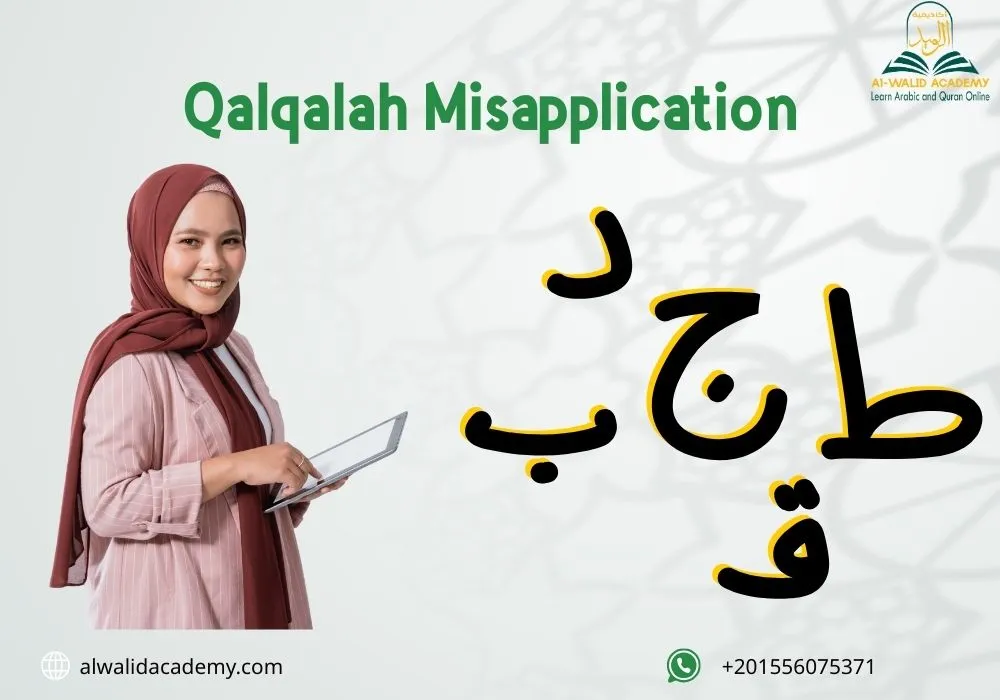Reading the Quran in Arabic is a beautiful journey, but small errors can change its flow and meaning. Knowing the common Tajweed Mistakes helps you recite perfectly and connect deeply with every word.
Let’s explore these mistakes together and make your recitation flawless and full of heart.
How to avoid Tajweed Mistakes and Make your read Impactful
Reading the Quran in Arabic is not just memorized words, but a complete art that requires correct pronunciation of letters, stops, and starts so the meaning reaches fully and the spirituality of the words is felt.
Even those who have memorized the Quran sometimes make small Tajweed Mistakes that make the recitation less clear and less impactful.
When you learn how to avoid these mistakes, you will feel that every letter has its value, and you will feel peace and tranquility while reading.
Focusing on elongation (Madd), nasalization (Ghunnah), and proper pronunciation of letters, along with following professional reciters and continuous practice, will make your recitation more precise and beautiful.
Also, reviewing with a skilled teacher will help you overcome all Tajweed Mistakes and achieve a distinguished and impactful recitation for everyone who hears you.
Read about: How to Improve Your Quran Recitation
Benefits of Reading the Quran in Arabic
The Arabic language is designed so that every letter and word has its energy and effect on the heart and mind.
When you read the Quran in Arabic, you not only preserve the original text, but also gain great reward, calm your heart, improve memorization and fluency, and strengthen your spiritual connection with the Quran.
Here, we will explain the main benefits you get from reading the Quran in Arabic
1. Preserves the Quran in Its Original Form
Reading the Quran in Arabic preserves the original text exactly as it was revealed without any loss in meaning or spiritual impact.
Translations, no matter how accurate, cannot convey all the details and eloquence of Arabic, every letter and word is in its correct place, making the meaning reach the heart and mind fully.
Preserving the original text is not only important for worship but also helps understand the context and original language structure.
2. Multiplies Your Rewards with Every Letter
Every letter you recite in Arabic has a great reward from Allah, making Arabic recitation unique, every correctly pronounced letter earns ten good deeds, even if it’s a short word.
Arabic letters are designed so that proper pronunciation itself is an act of worship, each correct letter purifies your mind and heart, bringing you closer to Allah.
This reward continues, making Arabic recitation spiritually rich and multiplied, not only during reading but also afterward.
3. Soothes the Heart and Calms the Soul
Reading in Arabic has a magical effect on the heart and mind. The sounds and pronunciation give a sense of peace and calm.
When you read the Quran in Arabic, your mind disconnects from stress and daily pressures, and you feel inner tranquility. Reflecting on the meanings while reading makes you feel even calmer.
Listening to correct Arabic pronunciation also relaxes the nerves and improves focus and comprehension.
This is why many people prefer reading or listening in Arabic even if they don’t understand every word—it gives a sense of psychological comfort and balance, turning reading into a full spiritual experience, not just words on paper.
4. Enhances Memorization and Fluency
The Arabic language itself helps memorization faster and more accurately.
When you read the Quran in Arabic, your mind becomes familiar with the sequence of letters and natural rhythms, which makes the words stick in memory more easily.
The natural repetition and melody of Arabic words help solidify meanings and sounds, which is very important for memorizers and those reviewing the Quran.
Reading in Arabic also improves fluency—you can read faster and more accurately without mistakes in letters or words.
Fix your Tajweed Mistakes and improve every letter’s pronunciation with our Quran Memorization Course, so your recitation is accurate and rewarding.
5. Deepens Spiritual Connection and Guidance
Reading in Arabic strengthens your spiritual connection with the Quran because it brings you closer to the original message.
Every Arabic word carries a spiritual power and divine meaning, making you feel faith more deeply.
Direct understanding of letters and correct pronunciation allows you to interact with the meanings personally, making the Quranic experience more impactful on your heart.
6. Protects the Quran’s Authentic Message
When you read the Quran in Arabic, you protect the original message exactly as it was revealed without distortion or loss of meaning.
Translations, no matter how precise, cannot convey all the details and eloquence in the Arabic text.
Preserving the original text is crucial for worship and deep understanding of the Quran, and also ensures memorization and review are accurate without mistakes.
This keeps the Quran you read close to the true meaning and original eloquence, maintaining the divine message from any alteration or change.
Read about: Benefits of Becoming a Hafiz
Common Tajweed Error Types
Reading the Quran correctly is not always easy, and many people make Tajweed mistakes without realizing it.
Knowing these error types is the first step to improving your recitation, making every letter pronounced correctly, and ensuring the meaning comes across clearly.
Here, we will explore the most common mistakes that happen during recitation, understand the differences between them, and learn how to avoid them properly.
1. Clear (Lahn Jali) Mistakes
Lahn Jali is a mistake that is very noticeable to the ear and often changes the meaning of a word or sentence.
For example, if you pronounce the word "رَبَّنَا" incorrectly, the meaning changes completely, which affects the correctness of your reading and memorization.
This type of mistake requires great attention, focusing on every letter and tone.
The best way to correct clear mistakes is through:
-
Review with a teacher
-
Listening to professional reciters’ recordings
-
Continuous practice, with consistent practice
Over time, this mistake fades away, making your Quran recitation clearer and more beautiful.
2. Hidden (Lahn Khafi) Mistakes
Lahn Khafi is a mistake that is difficult to notice easily and usually occurs in:
-
Nasalization (Ghunnah)
-
Elongation (Madd)
-
Pronouncing some letters too weakly or strongly.
Hidden mistakes usually do not change the meaning, but they reduce the beauty and accuracy of recitation.
To avoid this type, you need full awareness of Tajweed rules, listen to yourself while reciting, and review with a skilled teacher.
Access our Quran courses online to correct your Tajweed Mistakes, practice proper stops, and perfect your recitation at your own pace.

Articulation Point (Makharij) Mistakes
Many people make Tajweed Mistakes because they misplace the letters, which can make a word pronounced incorrectly or slightly change its meaning.
Understanding Makharij or articulation points is the key to correct recitation because it determines the exact place of each letter in the mouth, throat, or lips.
Here are the common mistakes caused by wrong tongue, throat, or lip positions, and how to avoid them so your recitation becomes correct, clear, and your voice sounds beautiful, natural, and precise.
-
Misplacing tongue, throat, or lip positions causes mispronunciation
Arabic letters have specific places in the throat, tongue, and lips, and any mistake in these places changes the sound and makes the word pronounced incorrectly.
This type of mistake can be obvious to hear or hard to notice, but it affects clarity and meaning.
When you learn to place each letter correctly, you can pronounce any word easily and accurately, making your voice closer to the correct recitation of professional Qaris.
Practice correct pronunciation and letter clarity in our Arabic language Course supporting better recitation and rule application.
Details of the Mistake and How to Avoid It
Most mistakes in Makharij happen when:
-
The tongue is not in the correct position for letters like Qaf, Kaf, or Ta
-
Or when the throat is not properly positioned for some letters.
-
Also, lips, if misused or pressed incorrectly while pronouncing letters like Ba or Meem, can change the sound.
To avoid this, you need to know exactly where each letter comes from—throat, tongue, or lips—and then practice it carefully with a teacher or recordings of professional reciters.
Enhance your fluency in Quranic terms with our Quranic Arabic Course, ensuring each letter and rule is applied correctly to avoid common mistakes.
Vowel Length (Madd) Errors
One of the things that often makes Quran recitation incorrect is Madd or vowel length errors.
Madd not only makes the sound more beautiful, but it is also very important for the meaning of the word.
Changing the length of vowels can alter the meaning or lead to incorrect pronunciation.
Our Quran lessons for Kids online help young learners master Tajweed rules from the start, preventing mistakes in Madd, Ghunnah, and stops.
Addition or omission of long vowels changes meaning
Madd, or the length of Arabic vowels, plays a major role in the meaning of a word.
If you add an extra vowel or shorten a long one, it can completely change the meaning or make the word pronounced incorrectly.
This type of mistake is common, especially for people who are still learning to read, and it affects the clarity of letters and the understanding of the meaning.
When you learn the correct length of each vowel and stick to it, you can read more accurately and the meaning reaches correctly for every word.
How to Avoid Tajweed Mistakes in Madd
Most Madd errors happen when vowels are lengthened more than necessary or shortened too much.
For example, the word "قال" if its Madd is wrong, the sound changes and sometimes the meaning can differ.
To avoid this, you need to know the Madd signs well, like the Alif Madd, Waw, and Ya when they are used as Madd, and practice them with a teacher or recordings of professional reciters.
Learn about: Overcoming Challenges in Quran Memorization
Ghunnah and Nasalization Mistakes
Ghunnah, or the nasal sound in Noon and Meem with Shaddah, is one of the most important Tajweed rules that make recitation correct and beautiful.
Many people either ignore Ghunnah or exaggerate it, which makes the pronunciation incorrect and the word unclear.
Here, we will talk about the most common Ghunnah mistakes, explain when to use the correct nasal sound, and how to control it so that recitation becomes precise, natural, and your voice sounds beautiful.
Incorrect or exaggerated nasal sounds in Noon and Meem with Shaddah
Ghunnah in Noon and Meem is an important part of sound beauty and reading accuracy.
If you skip it or exaggerate it, it affects the clarity of the word and the correct pronunciation, this type of mistake is very common, especially for beginners.
When you know exactly when to use Ghunnah and its correct duration, you can read any word accurately and make your voice very close to the ideal recitation of professional Qaris.
Details of the Mistake and How to Avoid It
Most Ghunnah mistakes happen when:
-
It is skipped in Noon or Meem with Shaddah.
-
Or exaggerated too much, which makes the sound unbalanced.
To avoid this, you must know the rule well: the Ghunnah duration is approximately two to four counts depending on the context, and practice applying it with a teacher or authentic reciter recordings.
Qalqalah Misapplication
Qalqalah, or the echo of certain letters, is one of the most important Tajweed rules that makes pronunciation correct and clear.
Sometimes people exaggerate the echo or weaken it to the point it disappears, which makes the word incorrect.
Here, we will talk about Tajweed Mistakes in Qalqalah and how to apply them correctly so that the sound is natural, correct, and clear.
Read about the meaning of Qalqalah
Weak or exaggerated echoing on certain consonants
Qalqalah is the bouncing sound of five letters: Qaf, Ta, Jeem, Dal, and Ba—when they appear at the end of a word or are sukun.
If this bounce is too soft or too strong, the recitation becomes incorrect and the sound differs from the ideal.
This type of mistake affects clarity, when you know the correct strength of the echo for each letter, you can read accurately and make your voice natural and comfortable to listen to.
Build a solid foundation in reading with our Online Noorani Qaida Course, preventing early Tajweed Mistakes in pronunciation and stops.
How to Avoid It
Most Qalqalah mistakes happen when the echo is too weak or too strong.
To fix this, you need to know the letters that require Qalqalah and the correct echo strength.
Practicing with recordings or with a teacher will help you control the echo, making each letter audible and clear without exaggeration or weakness, ensuring the recitation is correct and pleasant to the ear.
Avoid common errors in reading the Quran by joining our Quran Classes For Adults, where each session focuses on correct articulation points (Makharij) and Tarteel.

Breath Control & Pausing (Waqf & Ibtida) Errors
Controlling your breath and using proper pauses is one of the most important things that make Quran recitation accurate and clear.
Sometimes people stop at the wrong time or start a word at the wrong moment, which makes the recitation not smooth and can change the meaning.
Here, we will talk about common breath control and pausing mistakes, and we will explain how to read correctly without stopping or starting incorrectly so the voice stays natural and the meaning reaches properly.
Learn about: Where to Stop and Continue in Quran
Improper stopping or starting disrupts meaning and flow
Correct pauses and starting words at the right moment are very important so the meaning reaches clearly and the recitation is smooth.
If you stop in the middle incorrectly or start a word at the wrong time, the voice becomes broken and the meaning changes.
This type of Tajweed Mistakes is common, especially for people who are still learning Tajweed.
When you learn the correct timing for stopping and starting, the recitation becomes more accurate, smooth, and the voice natural and pleasant to listen to.
Learn every nuance of Arabic letters in our Tajweed Course, fixing mispronunciations and applying rules correctly so your recitation is flawless.
How to Avoid It
Most mistakes happen when:
-
people stop
-
or start words without knowing the correct rules for Waqf (pausing) or Ibtida (starting).
To avoid this, you must memorize the pause signs and know when to start the word after the pause.
Practicing with a teacher or following recordings of professional reciters helps you distinguish between correct and incorrect stopping.
Continuous practice makes your voice natural and smooth, and the recitation clear, with the meaning delivered correctly without any confusion.
Ignoring Letter Characteristics (Sifaat)
Each letter in Arabic has specific characteristics (Sifaat) like strength or softness, and ignoring these makes the pronunciation incorrect and the word mispronounced.
We will talk about mistakes of ignoring letter characteristics and how to apply them correctly so the sound is clear and beautiful, and every letter is pronounced correctly.
Enroll in our Quran Recitation Course to practice proper pauses, letter characteristics (Sifaat), and avoid skipping essential rules like Idgham or Ikhfa.
-
Overlooking loudness (Tafkheem) or softness (Tarqeeq) rules
Some letters in the Quran have specific traits: they can be heavy (Tafkheem) or light (Tarqeeq).
If you ignore the correct trait, the sound will be incorrect and the recitation not precise.
This type of mistake affects the clarity and beauty of the recitation. When you know each letter’s trait and follow it, the reading becomes more accurate and your voice natural and clear.
Start with our Learning Arabic for Beginners course to recognize sounds and articulation points, which directly improves your Tajweed accuracy.
Details of the Mistake
Most mistakes happen when people forget to apply Tafkheem and Tarqeeq rules, like the letter Ra or Daad which can be heavy or light depending on its position.
To avoid this, you must memorize the rules for letter characteristics and practice them with a teacher or recordings of professional reciters.
Incorrect Recitation Speed (Lack of Tarteel)
Reading speed is one of the most important things that affects the clarity of Tajweed and the beauty of the voice.
If we read too fast, the letters and rules are not applied correctly and the meaning may get confused.
Reading too fast sacrifices clarity and rule application
Tarteel, or gradual reading, is very important so that each letter is pronounced correctly and every rule is applied properly.
If you read too fast, the voice becomes broken and the meaning does not reach correctly.
This type of mistake occurs for people who want to finish the Surah quickly. Most speed mistakes happen when the reader rushes to finish quickly or shortens the pronunciation of long letters.
To avoid this, read slowly and focus on the Madd, Ghunnah, and the natural sound of each letter.
Read about: How to Recite the Quran Beautifully ?
Skipping Tajweed Rules Altogether
Ignoring Tajweed rules completely makes the reading incorrect, and the words may be mispronounced or the voice becomes dull.
Omitting key rules like Idgham, Ikhfa, Izhar leads to dull recitation
In Tajweed, there are essential rules like Idgham, Ikhfa, and Izhar. If you ignore them, the voice becomes dull and the reading is not precise.
This type of mistake makes words pronounced incorrectly or boringly. When you know these rules and apply them, the reading becomes clear, letters are precise, and the voice natural and beautiful.
Most mistakes happen when people forget to apply Idgham, Ikhfa, and Izhar rules or underestimate their importance.
And to avoid this, you must memorize the rules well and practice them regularly with a teacher or recordings of professional reciters.
Stand Out in Quran Recitation with Al Walid Academy
If you want to master Tajweed and prevent common mistakes, Al Walid Academy is the ideal place for you!
With us, you will learn Tajweed in an easy and enjoyable way, and our teachers will give you personal attention so your voice is accurate and all the rules are applied correctly.
Our advantages:
-
Personalized guidance for every student to make sure Tajweed is fully mastered.
-
Modern and practical teaching methods, not just theoretical.
-
Continuous support and spiritual guidance to strengthen your connection with the Quran.
-
Organized and clear content suitable for all levels.
-
Flexible sessions according to your schedule.
-
Option to learn online or attend in person.
-
Continuous review to correct pronunciation and perfect your voice.
Don’t waste any time—start your journey with us now! For any inquiries or registration:
-
Customer service: +201556075371
-
Or email us at: alwalidacademy42@gmail.com
If you want to benefit more and understand all Tajweed Mistakes and their rules in detail, don’t stop here!
Learn Quran, Arabic, and Islamic Studies with certified teachers in fun, interactive, and personalized sessions. Join thousands of students around the world and begin your path today!
Conclusion
Now that you know all the secrets of Tajweed Mistakes and how to avoid them, the opportunity is in front of you to start reading the Quran correctly and clearly.
Don’t let small mistakes affect your voice or your reward, and learning Tajweed properly will let you pronounce every letter correctly and enjoy every word.
Al Walid Academy is here to support you, with experienced teachers giving you personal attention, and modern teaching methods combining practical application and spiritual guidance.
You will benefit from clear content, continuous review, and flexible sessions that fit your schedule, all helping you control your voice, recite slowly, and apply every Tajweed rule correctly.
Don’t waste any time—start your journey with us now and feel the difference of proper recitation in your life.
FAQs
What are the most common Tajweed mistakes?
Most people make mistakes in pronouncing letters, not applying Madd and Ghunnah rules correctly, and wrong pauses sometimes change the meaning.
How can I correct my Tajweed mistakes?
The best way is to learn with a teacher who monitors your progress or listen to recordings of professional reciters and practice each letter and rule.
Why is Tarteel important in Quran recitation?
Tarteel is important so that the recitation is clear, the meaning is conveyed correctly, and all rules are applied properly.
Can Tajweed mistakes change the meaning?
Yes, if you stop or start at the wrong place or pronounce letters incorrectly, the meaning changes, which affects the recitation.
How long does it take to fix Tajweed mistakes?
The duration varies depending on the person and their practice, but with continuous practice and guidance from a teacher, you can notice improvement within a few weeks.
Is online learning effective for Tajweed?
Definitely, but it’s important to have a teacher who reviews and corrects you, and with proper content, you can quickly improve your voice and application of rules.

